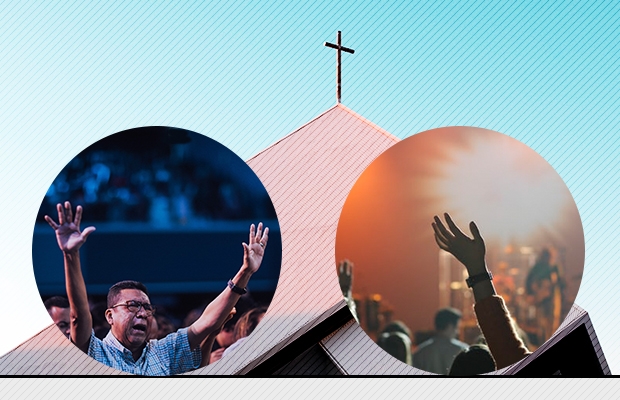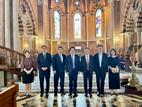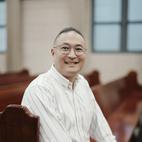In 2012, a book entitled Called to Awaken the Laity was published in China. Its author, a Korean pastor Yu Hanchin, is a pioneer in discipleship. The book was his life work. When it was first translated into Chinese and introduced by Taiwan's Taoseng Press in 2011, a Chinese pastor said, "I believe the book will bring great blessings to the Chinese Church."
However, eight years after its publication in China, the term "the laity" is still new to its Christian community. The majority haven’t heard of nor understood it. In modern Chinese, the meaning of the term is generally understood as a "plain and common believer" suggesting that there is another type of believer, a "special and higher level of believer".
The term originates from laity in English and it’s the antonym to clergy. Precisely it means "a member of a church who has not been granted a clergy position". However, the first-generation Church did not apply a so simple bisection method by dividing believers into the clergy and non-clergy groups. From an etymology point of view, laity is derived from the word lai in ancient French and laicus in Latin, and laicus derives directly from laikos in Greek, which means "the people". In general, the word is used in the Old and New Testaments to refer to "the chosen people of God". Therefore, some pastors conclude from the inference that all members of the first-generation Church should fall within the category of laicus which should be translated as believers but not as ordinary believers.
The term laity doesn’t appear in the Bible, but its meaning is very close to the term “disciple,” which appears 348 times and “saint” appears 63 times in the Bible.
In response to the topic, the Christian Times, a Shanghai-based Chinese Christian newspaper, recently had an online group interview with four pastoral workers who are in their 30s and 40s.
Brother Li: I’m in my 40s and a member of a fellowship in east China.
Brother Lv: I’m in my 30s and a fellowship leader in east China.
Brother Liu: I’m a pastor from central China and in my 30s.
Brother Jiang: Hi, I’m in my 30s and from a traditional church. Later on in my life, I learned of the "the laity movement".
Christian Times: What do you think of the calling on ordinary believers and the laity movement?
Brother Li: I heard of the term a few years ago and came to realize that we actually belong to this category. Now an increasing number of ordinary believers is dissatisfied with the current Church system. Consequently, many young Christians prefer to have their own circles and fellowships. Later, I studied modern Chinese Church history and found that it was a movement of the ordinary believers that gave rise to the Chinese Church in the post-Cultural Revolution era including the three-self Church that is within the System. It was because, during the Cultural Revolution, the Church was gone, pastors were arrested, and the ordinary believers remained.
Now if you go to a rural area and find congregations that are from the Cultural Revolution era, and you ask them if they know famous pastors like Wang Mingdao, Lin Xiangao or Yuan Xiangchen, most of them will say no, as they are ordinary believers. They organized themselves to read, pray, and study the Bible. Although they didn't study theology, they had passion. This is how they began.
Now due to the temporary suspension of on-site religious gatherings, many pastors find it difficult to adapt to on-line services. Some pastors within the System don’t really care about their ministry. In those cases, ordinary believers have organized themselves to develop spiritually. They form groups of two or three in the neighborhood and are free from their ‘ministers’. So I predict that laymen believers will play an important role in the Chinese church because of the impact of the pandemic.
Brother Li: Talking about the layman believer movement, you can refer to the history of the Reformation. During the Reformation, Calvin and Luther's formed a national Church. They worked closely with the authorities to establish a national church after the Roman Catholic system was brought down. So, a nation’s official religious system was established to protect the Church as its official Church of the nation. However, unlike the national Church movement, the Anabaptists had two principles: one was the Free Church, which emphasized separation from the state; and the other was a union of the ordinary believers to form a Church belonging to the ‘ordinary’. For instance, the Moravians have shared property and no hierarchy. All believers work together. The Chinese Church is deeply influenced by the Western national Church movement. Today both three-self and house Churches take the route of the national Church emphasizing the hierarchy of clergy and the privileges of pastors. I think the Chinese Church needs to learn more from the Anabaptists.
Christian Times: You mentioned the Reformation. Do you think the Catholic monastery movement before the Reformation was also a kind of layman believer movement?
Brother Li: The monastery was a bit similar in concept, but it was meant to be separated from the world, set-apart from the world. Yet, not from the state – not the type of separation of the Free Church. The the laity movement placed more emphasis on the latter.
Christian Times: Now that you don’t even think Catholic monasteries were the ‘ordinary’ movement. Then if Jesus was leading an ‘ordinary’ movement and the first-generation Church was also very much into it, would you say the ‘movement’ gradually declined starting slowly from the post-Apostle era to particularly when the Roman Empire was converted? Was there a gap of a thousand years till the Reformation and the Anabaptists?
Brother Li: I don’t think so. There had been many struggles by the ordinary believers over the past one thousand years especially during the Medieval period.
Brother Liu: I think the Chinese Church itself is the result of a kind of the laity movement. It is especially obvious in rural churches. The pastors in my hometown are similar to these kinds of believers. Many serve the congregation as volunteers, for example, quite a few female preachers serve full-time in churches while their husbands do business somewhere. A lot of small churches have ordinary believers participating in services.
It’s not so in urban churches. Their pastors are theologically equipped, but now ordinary believers are very busy with work, so they can’t participate much in church. The congregation is not equipped for services like sermons and Bible studies which are to be conducted by theology graduates.
Christian Times: But now serving in rural churches is increasingly difficult because continuing voluntary services means many pastors won’t have a salary and be able to make a living.
Brother Liu: Yes, it is very difficult now and many churches can’t keep preachers because they have left to find work. The few hundred Yuan a church offers can’t sustain a family at all.
Brother Jiang: I’d like to refer back to the model of the national Church that was mentioned. I don't think China is in a position where it can establish a national religion like has been done in the West. We don’t have such a tradition in Chinese history. Religion has no way to gain the kind of (national) influence as it does in the West. Now if Chinese society develops and leaves the ordinary believers some room, it’d be possible to have a national religion here.
How have I become aware of the ‘ordinary’ movement? It was because I am an ordinary believer myself. Pastors as a group are of course concerned about the hierarchy of the church, but I am an ordinary believer so I am concerned about how to express my faith in my own life. I think this is the need of ordinary believers.
Brother Lv: The way I understand the concept of the laity movement is different from the two brothers. They refer to an independent movement of ordinary Christians as a group against the clergy. They simply attached the word ‘ordinary’ to their views. As I understand the "the laity movement,” it is still closely related to the development of the Church as now the institutional Church encounters a bottleneck in which it reaches its limit. So the ordinary believers will rise in this historical context and they will play a positive role in the development of the Church.
Christian Times: Do you mean that Church leaders can hardly achieve anything due to the many constraints within the bureaucracy and hierarchy of the Church, which is giving rise to the ordinary believers?
Brother Lv: Yes.
Brother Li: Regarding the core message of Brother Lv, nothing is changed from the System of the traditional Church. So I don't think his idea belongs to the ‘ordinary’ movement. I think what he refers to is rather the normal mobility of people. My understanding of it is similar to that of Brother Jiang’s, emphasizing the communication between each believer and God as well as the equal relationship between believers and the exchange of fellowship.
Brother Lv: I think you're talking about an idealized state which is just an idea. In reality, even if four or five people gather together, there must be someone to organize and plan. For instance, our interview now needs a host. Would that not be called an the laity movement?
Brother Li: We are in a meeting, not a (religious) gathering.
Brother Lv: Any gathering needs someone to come forward and organize. There will be no meeting with you guys without its organizer. This is the same in a church where there will be someone who needs to contribute more than others. Regarding the contribution, no one is equal in it. It is impossible to achieve that.
Brother Li: What you’ve just referred to was order. I'm not against order neither against the Church. I'm against the traditional Church System, for example, the Catholics emphasized the supremacy of the clergy. What I object to is hierarchy. Over-emphasis on hierarchy leads to the belief that ordinary believers are not qualified to interpret the Bible or not eligible to read the Bible but only the clergy is.
Brother Liu: From the viewpoint of the history of the Church, the monastery movement from the end of the first-generation Church to the early Medieval period was often born outside the System. Then, its impact was felt in the Church. The Church didn’t deny the monastery, but integrated it into the Church System. It can be seen that there are tension and supplement between the movement of the ordinary believers and the religious clergy. A historical process from opposition to unity is needed. The the laity movement we’re discussing needs the debate on whether they play their roles within the Church or they have Christian organizations outside the Church. I think that either way may be possible and they are complementary to each other.
Christian Times: Brother Jiang just made a very constructive comment. You said that the movement was neither in the Church nor outside it, but how to live the individual’s faith in real life as an ordinary believer’s appeal. Can you go into specifics about this appeal?
Brother Jiang: We grew up with the idea of a state religion – what role the Church should play in society to establish a state religion. However, ordinary believers are not in that position and they won’t build a thing as such. So my concept of the movement is that while we go to our churches we also are often in contact with society. We become more integrated into society by getting out of the rut where we need the approval of the Church and then are not involved in society. We need to play a more positive role in society.
For instance, during this pandemic, what society needs is stability, healing, or a calm mind to maintain social stability. However, the message conveyed by the Church is rather negative, sharing ideas on things like the apocalypse. In fact, we should take heart and actively cooperate with the country by not going out much. This is also a contribution. We should stop insisting on on-site gatherings or claim that the pandemic is a sign of the apocalypse.
Brother Lv: So many churches have donated money and materials during the pandemic, do you all turn a blind eye to it? Many churches have also informed believers not to go out often. Please speak objectively.
I stick to my guns. The seven of us got together online. This is our movement. Our ministry is a movement of ordinary believers, like in my fellowship in which I tell the members to be the light and salt in society. What we're doing is an the laity movement.
Christian Times: Brother Jiang and Brother Li were saying that ordinary believers should testify to their faith in the family and society, not just in the Church. Ordinary believers can become the salt of the world.
Brother Lv: I consider all these things. It's right to integrate with society, but this not about throwing the Church away.
Christian Times: What do you think are the challenges of ordinary believers now? How can they better develop?
Brother Lv: How you convey this vision is a challenge. The majority aren’t aware of it. For instance, what I'm doing now is conveying the message. I have been living at the bottom in my church, and that is what I have conveyed to the ordinary believers of my fellowship.
Brother Jiang: Self-awakening... It's very natural that a Christian goes to a certain point and reviews his faith rather than that we design a movement of ordinary believers in advance and then develop it to where it should be. I haven’t thought much of the challenges...
Christian Times: Is it because the movement is still in its infancy so you haven’t thought about it?
Brother Liu: At present, the movement should start from the Church by encouraging the congregation to participate in serving the Church more and testifying more in workplaces. There should be a balance between the two.
- Translated by Charlie Li












